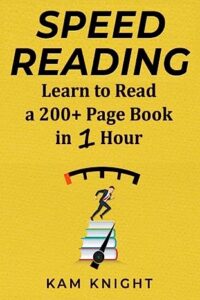Reading is so passé. But speed reading—actually, it became a thing in the 1950s. So passé as well.
But as a proud member of Generation X, I have earned the right to talk about things that are no longer cool, including something that several experts have labeled as glorified skimming.
On that note, let’s dive in, using this book as our guide.
In the author’s words: Reading is something that humans have created, and since it is human-made, it is not an instinctual skill that we are born to do. It is a skill that must be learned.
In other words, reading can be painful, so much so that society is full of non-readers. Thankfully, if you put in the time, you can get so efficient with reading that no other manner of absorbing information will be able to compete.
Here’s how.
Pre-read
Start with the big picture.
Before embarking on any reading project, it’s worth knowing why you’re even engaging. What’s your goal?
Particularly with nonfiction, flip through the book, noting the table of contents, the introduction (or preface), and any summary paragraphs.
Finally, be honest—is this material you can dominate quickly or, due to lack of familiarity or technical detail, something you’ll have to take a bit more slowly?
Improve Speed
Once you’re ready to roll, these tricks will help you pick up the pace.
Chunking or Space Reading
Reading one word at a time ain’t going to get the job done. Clumping several words together (preferably natural phrases) is key. Some actually prefer focusing their eyes on the spaces between words, letting the words naturally come along for the ride. Either way, exercises to improve peripheral vision can make the devoured chunks quite wide—perhaps even as wide as an entire line.
Avoid Subvocalization
Pronouncing words (out loud or in your head) will slow you down significantly. Don’t do it. Silence the voice in whatever way possible—read with your mouth closed, hum, or play instrumental music.
Limit Fixations
As you read, your eyes stop and fixate on a batch of words, jump to the next batch, stop and fixate, jump again, and so on. By expanding the size of the chunks you consume (as above), you’ll reduce the number of fixations. And by keeping your eyes moving along the text, you’ll reduce the duration of fixations.
Avoid Regression
Regression in life is bad. The same applies to reading. Rereading what you’ve just covered can ruin your flow, thereby slowing you down without necessarily boosting your understanding. So stay focused. And if you need to, slide an index card down the page as you read each line to help resist the urge to jump back up and reread previous lines.
Ensure Comprehension
As mentioned above, speed reading does have its naysayers, with the most common digs focused on velocity’s inverse correlation with comprehension. With that in mind, these pointers will help you actually absorb what your eyes are being trained to inhale.
Recall and Review
Every so often—thirty minutes or so—stop and attempt to recall from memory what you’ve read. Such pit stops can reinforce understanding and improve the probability of remembering the material down the line.
Visualization
Visualizing what you’re reading—as in creating a movie in your mind—can have a huge impact on engagement and comprehension.
Build Vocabulary
The more words you don’t quite understand, the less likely you are to understand the material as a whole. So start sleeping with your dictionary.
And finally, the good news: if you were just practicing your speed reading, you didn’t miss much.

4 Responses
While learning to read fast is helpful, isn’t there joy and satisfaction that comes from taking some time to read and enjoy a good book? Perhaps I feel this way because my attempt at speed reading felt like a workout 😁.
And my attempts at speed reading make my eyes hurt :). So yes, taking it slowly definitely has its merits!
i read the above blog in 37 seconds Just kidding! I am a slow reader myself.
Hahahaha. Sometimes slow and steady wins the race.